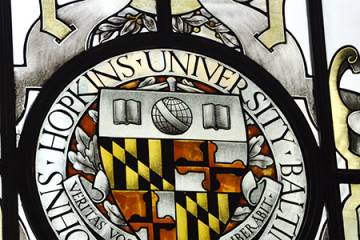Understanding the spread of dengue by integrating human mobility and genomics data. Advancing K-12 school safety and security technology by developing comprehensive guidance for school administrators. Applying a systems biology approach to find novel protective mechanisms against atherosclerotic cardiovascular disease. Enhancing community life in underserved areas of Baltimore through musical and visual arts programs. Using multimodal MRI to noninvasively locate seizures in epilepsy patients.
These are among 32 multidisciplinary endeavors that have been selected to receive support this year from Johns Hopkins University's Discovery Awards program. Each project team includes members of at least two JHU divisions or other entities who aim to solve a complex problem and expand the horizons of knowledge.
Altogether, the winning project teams—chosen from a record 222 proposals—include 120 individuals representing 12 Johns Hopkins entities.
"This year's proposals attested to the intellectual creativity and collaborative spirit of our university," says Ronald J. Daniels, president of Johns Hopkins University. "With these awards, faculty will have the freedom to pursue new avenues for discovery with colleagues across our community and to take up the most pressing questions we face as a society."
The Discovery Awards program was announced in early 2015, as was the Catalyst Awards program for early-career researchers. Together the two programs represent a $30 million commitment by university leadership, along with the deans and directors of JHU's divisions, to faculty-led research.
Thirty-three researchers representing 26 academic departments were named Catalyst Award winners earlier this month.
The Discovery Awards are intended to spark new interactions among investigators across the university rather than to support established projects. Teams can apply for up to $100,000 to explore a new area of collaborative work, with special emphasis on preparing for an externally funded large-scale grant or cooperative agreement.
The record pool of applications also required the highest number of reviewers used to date: more than 90 faculty members from across the university were called upon for their input.
"These new collaborations exemplify the impressive work being done at Hopkins," says Denis Wirtz, vice provost for research. "I appreciate our numerous researchers for submitting such brilliant projects, and I look forward to seeing the results unfold. These awards would not be possible without the continued support of university leadership and the reviewers' guidance."
The full list of recipients and descriptions of their projects is available on the Office of Research website.
Posted in University News, News+Info








